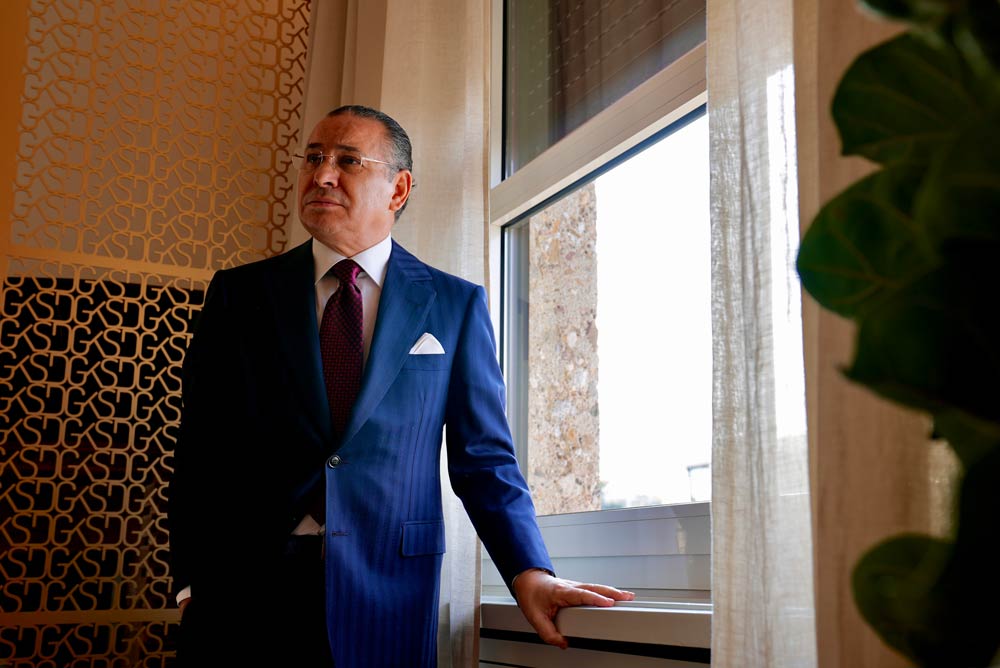
Kamel Ghribi’s journey from humble beginnings in Tunisia to becoming a pivotal figure in the global healthcare sector is a testament to his unyielding commitment and visionary leadership. His endeavors across various platforms reflect a profound dedication not only to advancing healthcare and education but also to fostering inclusive growth and unity across different regions. Ghribi’s ability to intertwine his deep-rooted values with his professional achievements offers a blueprint for responsible and effective leadership in today’s interconnected world. As he continues to influence and inspire, Kamel Ghribi remains a beacon of innovation and philanthropy, paving the way for a healthier, more educated, and more cooperative global community.
“Success means different things to different people, but one thing everyone has in common is the ability to make sacrifices to achieve them. Great success is born of great personal sacrifice; you must fight to achieve success”.
Kamel Ghribi, a Global Leader, Entrepreneur, and Philanthropist, is a man who has already accomplished a great deal, with even more on the horizon. He holds the position of President at GKSD Investment Holding Group, serves as President of IRCCS San Donato Hospital, and is the Vice President of both GSD IRCCS San Raffaele University Hospital and IRCCS Galeazzi Sant’Ambrogio Hospital. With such a diverse portfolio, Kamel Ghribi has made an undeniable impact in the healthcare sector on a global scale.
A proud son of Tunisia, Kamel Ghribi has a profound attachment to his homeland, attributing much of his success to his heritage. From humble beginnings, he learned a strong work ethic, dedicating himself entirely to the tasks and chores he needed to complete. His work ethic, combined with an entrepreneurial spirit, led him to leave his homeland and explore new territories. Leaving his country and family was bittersweet, but the outcomes have proven it to be the right decision, as he shows gratitude to his mother and Tunisia at every milestone he reaches. Kamel Ghribi is now one of the most influential figures in the healthcare industry. He believes that opportunities present themselves everywhere in the world to those who are ready to work for them, emphasizing the importance of collaboration and surrounding oneself with a good team.
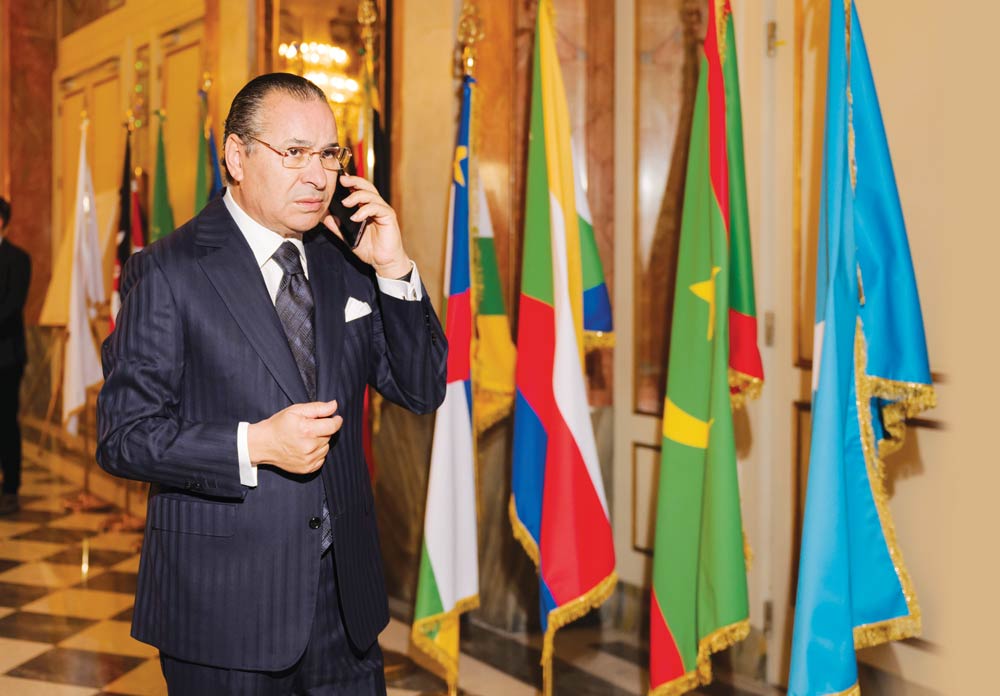
Kamel Ghribi’s North African heart has been deeply troubled by the events in the Middle East and Africa, particularly the lack of investment in sectors such as healthcare, education, and infrastructure. He began to openly discuss these concerns with those he esteemed most and who were in positions of influence. He perceived a lack of understanding between certain nations, which he believes deters many investors from initiating projects in these regions. Therefore, Kamel Ghribi turned to some of the most powerful tools humanity possesses: teamwork and communication. There is a long way to go, but Kamel Ghribi is paving the way for new generations of political and business leaders to embrace tremendous challenges and responsibilities instead of fearing them.
“Hospitals” Magazine is committed to highlighting the key figures shaping the healthcare industry, aiming to showcase those whose influence extends beyond their titles. Kamel Ghribi is a quintessential example of such a figure, having not only met but significantly surpassed the criteria for influence within the sector. His contributions are a testament to a career marked by unwavering commitment and visionary leadership. Each of Ghribi’s projects serves as a narrative of his core values and beliefs, embodying principles such as innovation, accessibility, and quality in healthcare. These initiatives are not just investments in infrastructure but in the very fabric of healthcare delivery, aiming to elevate standards and improve patient outcomes across regions.
Ghribi’s approach to decision making and strategic planning is holistic and deeply engaged, reflecting a personal investment that goes beyond professional obligation. He infuses his work with a level of dedication and passion that ensures not just the success but the excellence of every endeavor he undertakes. This commitment is the cornerstone of his remarkable success story, setting a benchmark for leadership in the healthcare sector. Moreover, Ghribi’s success is not measured solely by the profitability or size of his projects but by their impact on communities and the healthcare landscape at large. His strategies often involve collaborative efforts, bringing together diverse stakeholders to address complex healthcare challenges. This collaborative approach, coupled with Ghribi’s keen insight into the needs and potential of the healthcare sector, has led to innovative solutions that have reshaped healthcare delivery in various regions.
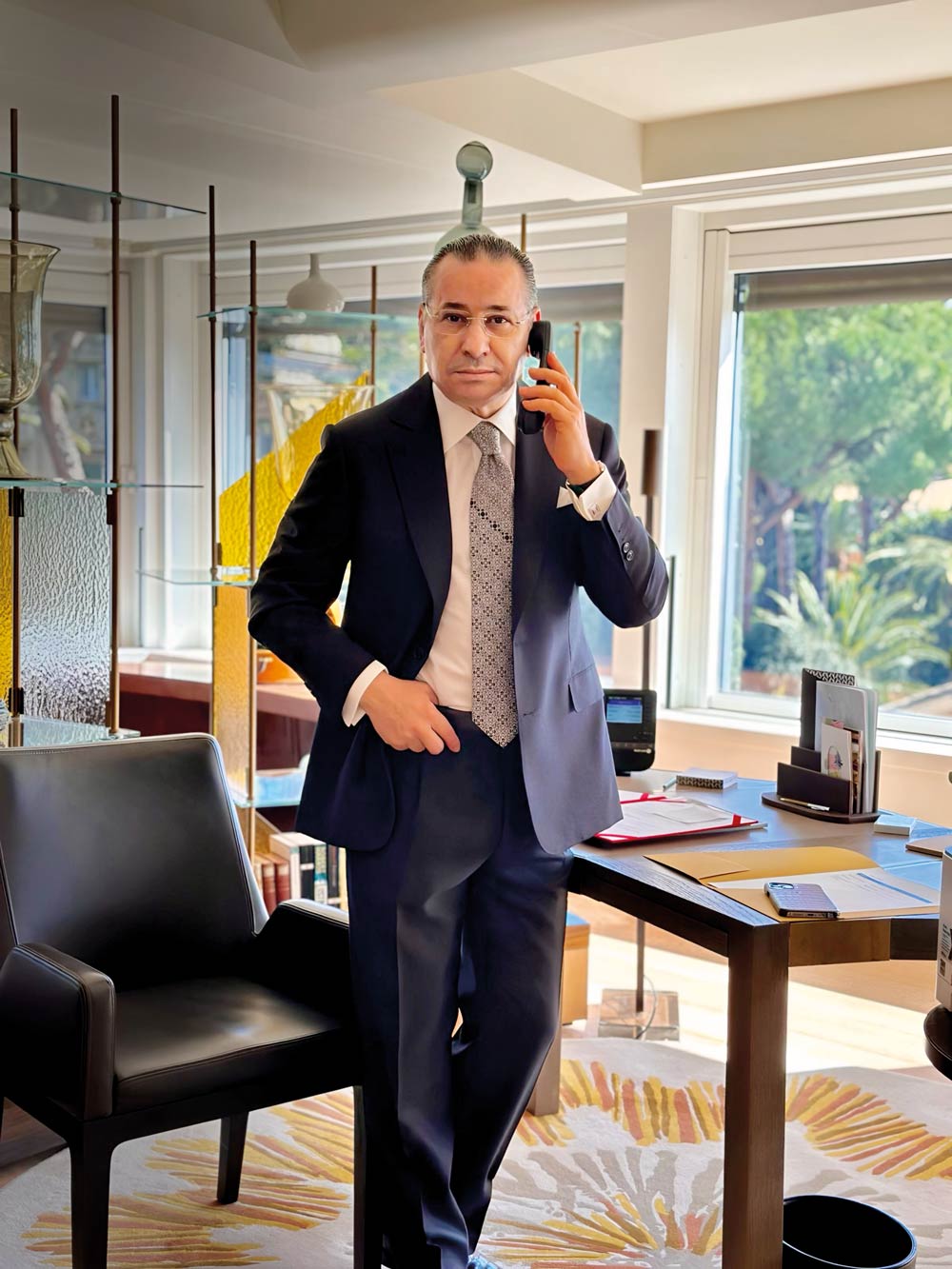
Mr. Ghribi, as a recognized leader in healthcare and investment, you’ve often mentioned the influence of your Tunisian heritage on your work ethic. How do you see your origins shaping your approach to entrepreneurship and global leadership?
My Tunisian heritage is a cornerstone of my identity and work ethic. It instilled in me a strong sense of perseverance, curiosity, and ambition from a young age. These values were the bedrock upon which I built my entrepreneurial journey. Embracing my origins while being open to global perspectives has allowed me to navigate and lead across diverse cultural landscapes. I believe in investing in people for a better tomorrow, which is a principle that guides all my ventures.
Mr. Ghribi, you have often emphasized the critical role of vision in leadership. Could you elaborate on how your personal vision has shaped your approach to leadership and influenced the strategic direction of your ventures? Furthermore, how do you see this vision fostering a culture of inclusiveness and mentorship within the business community and beyond?
Absolutely, I firmly believe that the essence of effective leadership lies in having a clear and compelling vision. My personal vision has always been a guiding force in every endeavor I undertake, shaping not only the strategic direction of our ventures but also the core values that define our organizational culture. This vision is deeply rooted in my beliefs, actions, and goals, and it revolves around creating sustainable value not just for our businesses but for the communities we serve. Throughout my career, I have learned that to indeed lead, one must be able to articulate a shared vision—a vision that not only forecasts future possibilities but also resonates deeply with the team, stakeholders, and the broader community. This approach has been instrumental in mobilizing collective efforts and inspiring our teams to achieve common objectives. It is about communicating a future that everyone wants to be part of and can believe in.
Moreover, I view entrepreneurship as a civic duty that extends beyond business. It involves mentoring the next generation and teaching them to thrive by transmitting skills and knowledge. This is crucial for their personal growth and for the advancement of our society. Our initiative aims to foster a culture where young people feel empowered, valued, and connected to their heritage and future opportunities.
However, achieving these goals requires overcoming barriers, including political and sectoral divisions. It is essential to advocate for inclusiveness and peaceful coexistence, pushing for a collective approach where everyone’s voice is heard and valued.
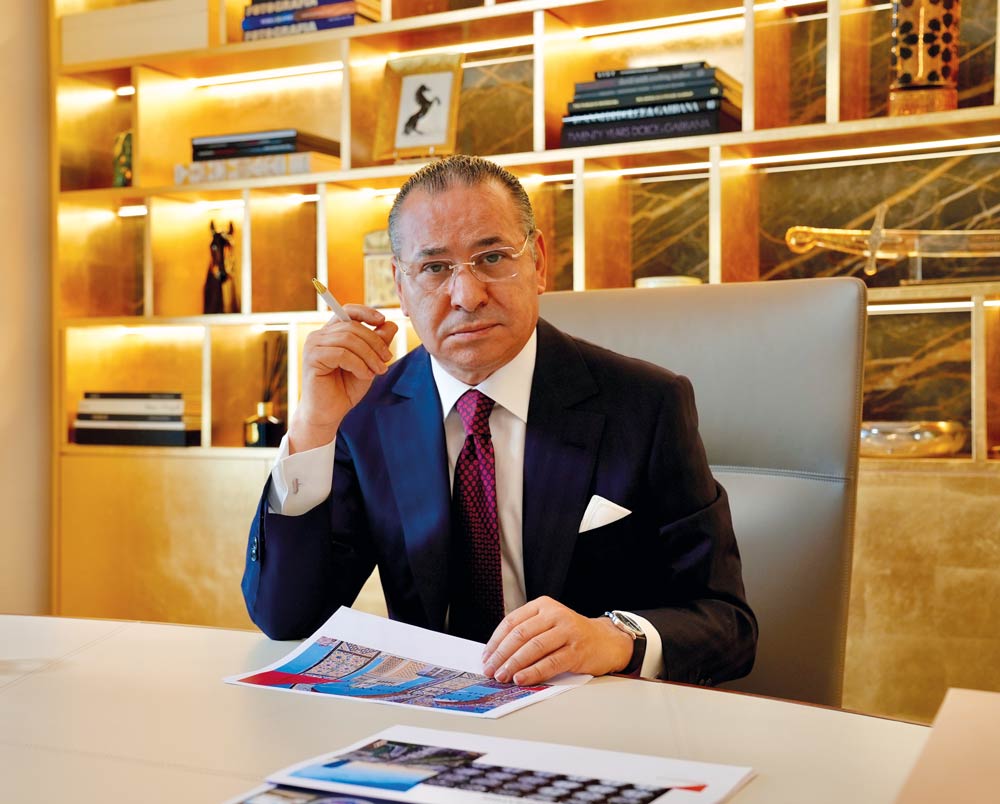
This inclusiveness must also translate into our economic strategies, ensuring that progress benefits all, not just a select few. In essence, my vision is about building bridges—between the present and the future, between businesses and communities, and among diverse groups. As a leader, my role is to ensure that this vision is not just mine but shared among all those involved in our journey, thereby creating a ripple effect of positive change that transcends our immediate sphere of influence.
Mr. Ghribi, you have articulated a passionate commitment to philanthropy, particularly in the realms of healthcare and education. How has your mission to leverage your business success for humanitarian purposes shaped the operations and priorities of GKSD Investment Holding, Gruppo San Donato (GSD) and the Non-Profit European Council for African and the Middle East (ECAM)? Additionally, how do you integrate these philanthropic goals into the strategic decisions and daily activities of your businesses?
My commitment to philanthropy is not just a personal ethos but a fundamental aspect of how we operate at GKSD Investment Holding. From the outset, I recognized that the success achieved in the business world, particularly in the petroleum sector, provided not just an opportunity but a responsibility to give back to society in meaningful and impactful ways. This understanding has deeply influenced the operational and strategic priorities of our Group.
We consciously integrate our mission of philanthropy into every facet of our business. This is evident in how we channel our resources, expertise, and networks into promoting universal access to healthcare and education. I believe these are the cornerstones of any civil society and must be accessible to everyone, regardless of their socio-economic, political, or geographical status. To actualize this, we support and endow institutions, particularly in regions that are underprivileged and underserved. For instance, as President of GKSD, GSD and ECAM I am in a privileged position to influence healthcare accessibility directly. We are not just running hospitals; we are fostering environments where knowledge, skills, and resources are shared.
Our projects often involve training local healthcare professionals, investing in medical infrastructure, and ensuring that the best practices in medicine are accessible even in the most remote areas.
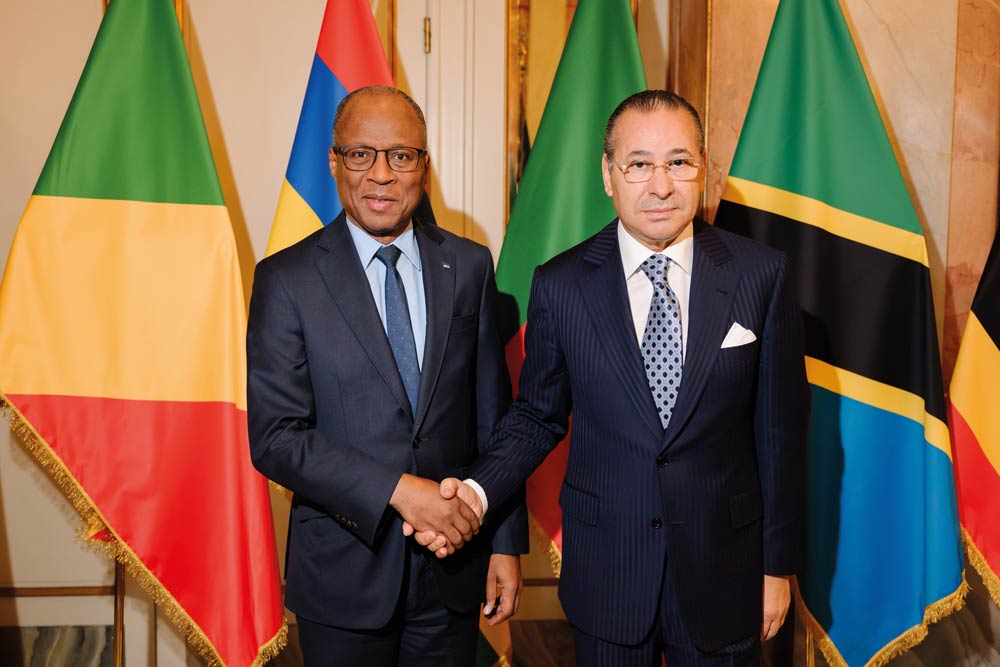
Moreover, our philanthropic approach is integrated into our business model. We view our investments through a dual lens of profitability and social impact. This dual focus ensures that while the business grows, it also meaningfully contributes to societal development. Every strategic decision we make considers its potential to support philanthropic goals, be it through direct funding, partnerships, or community engagement programs.
In essence, by embedding these philanthropic objectives into the DNA of our business operations, we create a virtuous cycle where business success fuels humanitarian efforts, and these efforts, in turn, stabilize and enrich the communities we operate in. This holistic approach not only advances our business objectives but also ensures we live up to the ancient ideals of philanthropy—loving humanity and building cooperative, tolerant, and respectful societies. Through these endeavors, we aim to leave a legacy that is not just measured in financial terms but in the betterment of human lives across the globe.
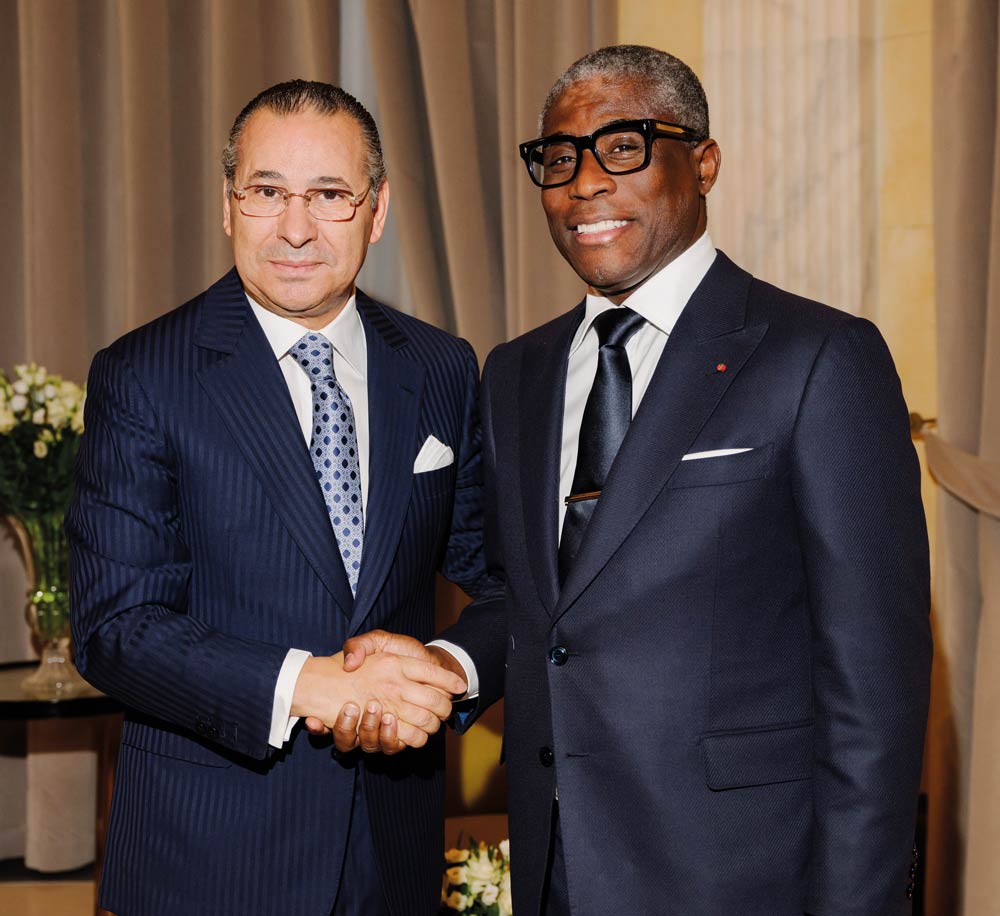
Your commitment to social responsibility extends through your engagement with cultural and historical legacies to enhance diplomatic and business relations. How do you operationalize this commitment within your business practices, particularly in regions like the Middle East and Africa? Could you detail how these principles influence your business models and contribute to local development?
Certainly, my approach to business has always been deeply intertwined with a strong sense of social responsibility. This perspective stems from the recognition that businesses, especially those operating on a global scale, have the capacity—and indeed the obligation—to foster positive change within the communities and nations they serve. This is particularly relevant in culturally rich and historically significant regions like the Middle East and Africa, where business operations can have profound social impacts.
From the outset, I have applied my business skills not only to pursue economic success but also to engage meaningfully with local institutions and state entities.
This engagement is crucial for developing a deep understanding of the cultural and historical contexts that shape business relationships and, ultimately, influence our business strategies. In practice, this means that every business decision and project is approached with a keen awareness of its potential cultural impacts and contributions to societal progress.
For instance, in our operations in the Middle East and Africa, we prioritize projects that are not only economically viable but also capable of contributing to the local social fabric. This might involve investing in healthcare and education—sectors that provide immediate benefits to local populations and lay the groundwork for long-term societal advancement. We engage in constructive dialogues with local leaders and stakeholders to ensure that our projects are aligned with the needs and aspirations of the communities.
Moreover, our commitment to social responsibility is reflected in how we build our business models. We deliberately integrate opportunities for local workforce development and capacity building.
This approach ensures that our presence in a region contributes to creating a skilled workforce, which is essential for sustainable development. We also emphasize the importance of creating opportunities for the youth, as they are pivotal for the future stability and prosperity of any society. Through partnerships with educational institutions and local businesses, we aim to provide pathways for young people to gain the skills and opportunities needed to succeed. This not only helps in reducing poverty and ignorance but also fosters a generation of well-informed, skilled individuals who can contribute to their society’s growth and stability.
In essence, our business models are designed not just to extract value from the regions in which we operate but to create it. By integrating social responsibility into the core of our business practices, we strive to not only achieve economic success but also contribute to peace and stability by fostering opportunities for growth. This approach has been fundamental in guiding our actions and ensuring that our legacy is marked by a meaningful contribution to a better world.
Could you provide an overview of GKSD Healthcare Management & Consulting’s role within the GKSD Investment Holding Group and the San Donato Hospital Group? Additionally, how does your diverse portfolio, encompassing sectors from real estate to healthcare, enhance your capacity to deliver integrated solutions across different regions?
GKSD Healthcare Management & Consulting is a vital entity within GKSD Investment Holding Group and the San Donato Hospital Group, strategically positioned to leverage our parent organizations’ extensive expertise and renowned excellence.
Established in 2020, our focus has been on providing top-tier strategic advisory services and integrated healthcare solutions, a mission that taps into the rich vein of knowledge and experience housed within our network, including the distinguished Vita-Salute San Raffaele University.

Gruppo San Donato – GSD (Part of GKSD Investment Holding Group); it is the largest private hospital group in Italy with circa €2.3 billion in revenues. Founded in 1957, GSD boasts 58 hospital facilities in Italy and 77 in Poland. The Group also includes three IRCCS (University Research hospitals), and employs over 26,000, people including over 8,000 doctors. Our facilities treat over 5.6 million patients a year and we have projects in over 15 countries.
Our teaching hospitals are internationally recognised as centres of excellence in scientific research and medical training. The Group research is ranked top 10 globally by medical research citations and we take pride in being a founding player in Gene and Cell therapy. With Microsoft, GKSD/GSD have a number of programs in development in AI-based diagnostic care. This of course enriches our understanding and capability in healthcare management. GSD’s leadership in the sector is supported by its commitment to cutting-edge technology and innovative care methodologies which are the principles that guide GKSD consulting services as well.
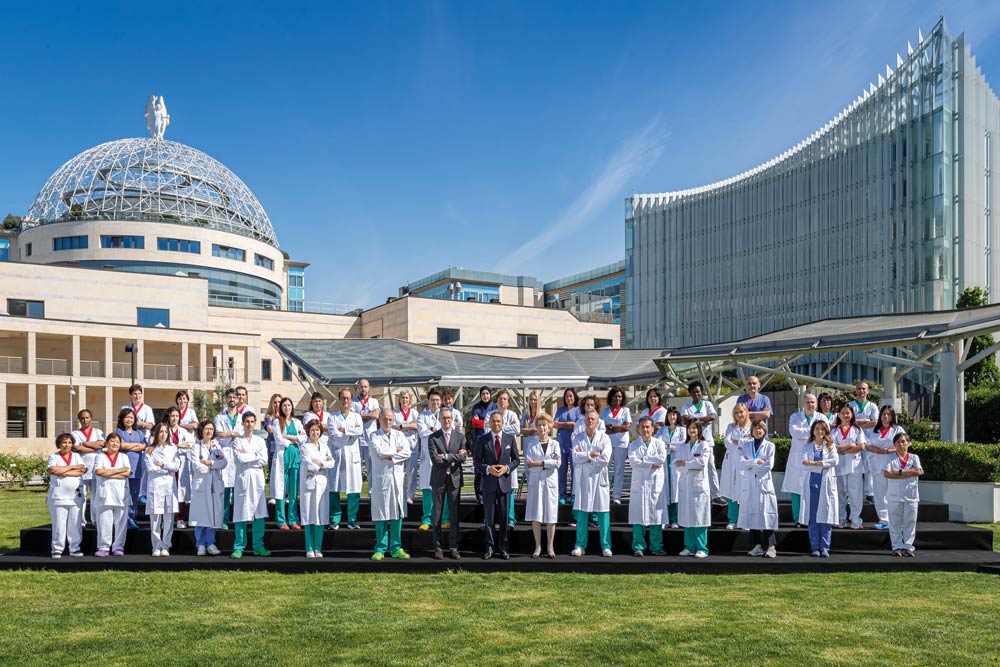
Our unique position in the market is also enhanced by GKSD Investment Holding itself. As a multidisciplinary Group we offer expert services in healthcare, procurement, strategic and corporate finance consulting, renewable energy solutions and engineering & construction. Thanks to a network of international relations that has been built over more than forty years of activity, GKSD Investment Holding has become the go to company in project management and consultancy. In particular, the GKSD Green Solutions arm was born from a drive to develop renewable and sustainable energy services. The GKSD Engineering & Construction arm specializes in the construction of major civil engineering and construction works, as well as in the management of complex urban renewal and regeneration projects. We already provide project support in various countries, including Iraq, the UAE and Romania, and are actively sharing our objective of enhancing healthcare facilities, energy supply systems, and infrastructure. This diversity is not just a strength but a strategic tool that allows us to draw on cross-sectoral expertise to offer more holistic solutions to our clients.
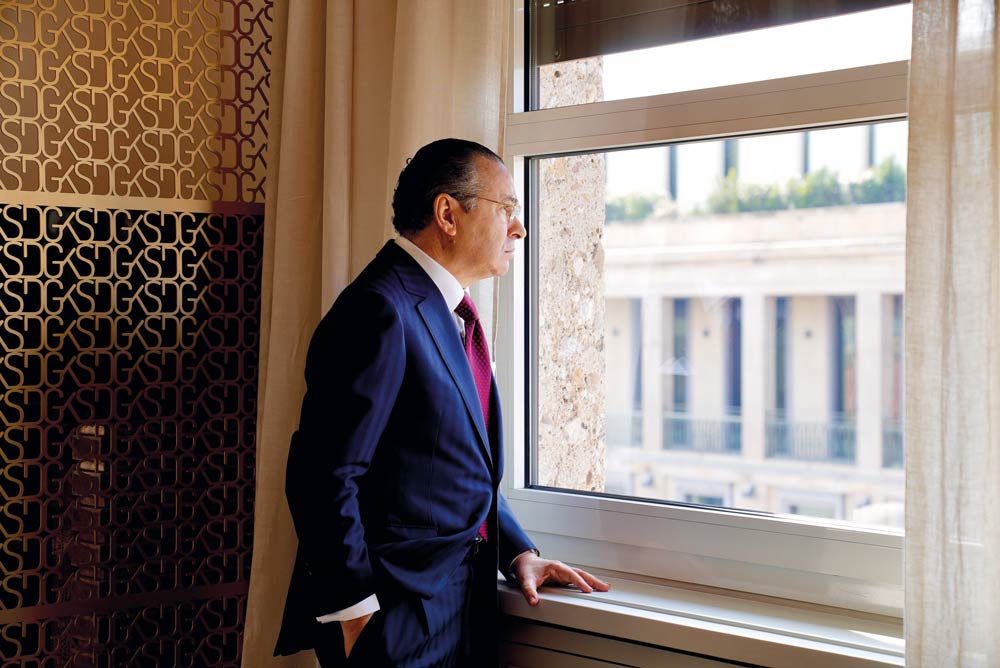
Whether it’s integrating advanced engineering solutions into healthcare infrastructure projects or leveraging our real estate expertise to enhance the physical accessibility of healthcare facilities, our broad sectoral engagement enriches our service offerings. Moreover, our geographical footprint extends across Italy, Europe, and the MENA region, with a significant local presence in Milan, Dubai, Riyadh, Baghdad, Bucharest, and Lugano. This widespread presence ensures that we are not only familiar with but deeply integrated into the local markets we serve, allowing us to tailor our solutions to meet regional needs effectively while maintaining a global standard of excellence.
In summary, GKSD Investment Holding and GKSD Healthcare embody a bridge between diverse sectors and regions, enhancing our ability to deliver integrated, innovative solutions that reflect the complex needs of the modern healthcare landscape. Through this integrative approach, we aim to contribute significantly to the improvement and evolution of global healthcare systems.
You have described the ECAM Council as a platform for fostering dialogue and cooperation between Europe, Africa, and the MENA region. Can you explain how this initiative aligns with your vision for integrating philanthropy into business practices? Moreover, how does the ECAM Council plan to tackle the challenges related to healthcare and education investments across these diverse regions?
The ECAM Council was conceived with the vision of not only enhancing dialogue and fostering new partnerships but also demonstrating how seamlessly philanthropy can be integrated into business and governance to generate positive global impacts. This alignment with my personal beliefs—that business and philanthropy are interconnected forces capable of driving substantial change—is foundational to the Council’s approach.
Our primary objective is to create a unified platform where Europe, Africa, and the MENA region can collaborate more closely, leveraging our collective strengths to address some of the most pressing challenges facing these regions today, particularly in the sectors of healthcare and education. These two areas are crucial because they form the backbone of any society’s potential for growth and development. Investing in them is not merely a charitable act but a strategic economic decision that benefits everyone.
For example, the COVID-19 pandemic has starkly highlighted the vulnerabilities and interdependencies of global health systems. It underscored the critical need for robust healthcare infrastructures as essential to economic stability. The ECAM Council is particularly focused on raising awareness about the importance of healthcare investment—not just as a cost but as a vital investment in the economic and social stability of a nation. By promoting and facilitating investments in healthcare and education, we aim to ensure that these fundamental needs are met, thereby fostering healthier, more educated populations who can contribute to their economies.
The Council also aims to serve as a conduit for greater cooperation by leveraging the unique position of Italy, and more broadly, Europe, as a bridge to Africa and the MENA region. Our choice of Rome for our second session is strategic, symbolizing and actualizing this bridging role. Rome’s historical and positive ties with these regions make it an ideal place to foster discussions that transcend borders and cultural barriers. In addressing these challenges, the ECAM Council plans to use its platform to create alliances akin to a league of nations—unified, without borders, inclusive, and welcoming to all. By doing so, we intend to transform the way nations think about and invest in healthcare and education, shifting the narrative from viewing them as burdens to recognizing them as critical investments that yield long-term benefits for all of society. Ultimately, the ECAM Council embodies my long-held belief that the business world has a crucial role in strengthening national institutions.
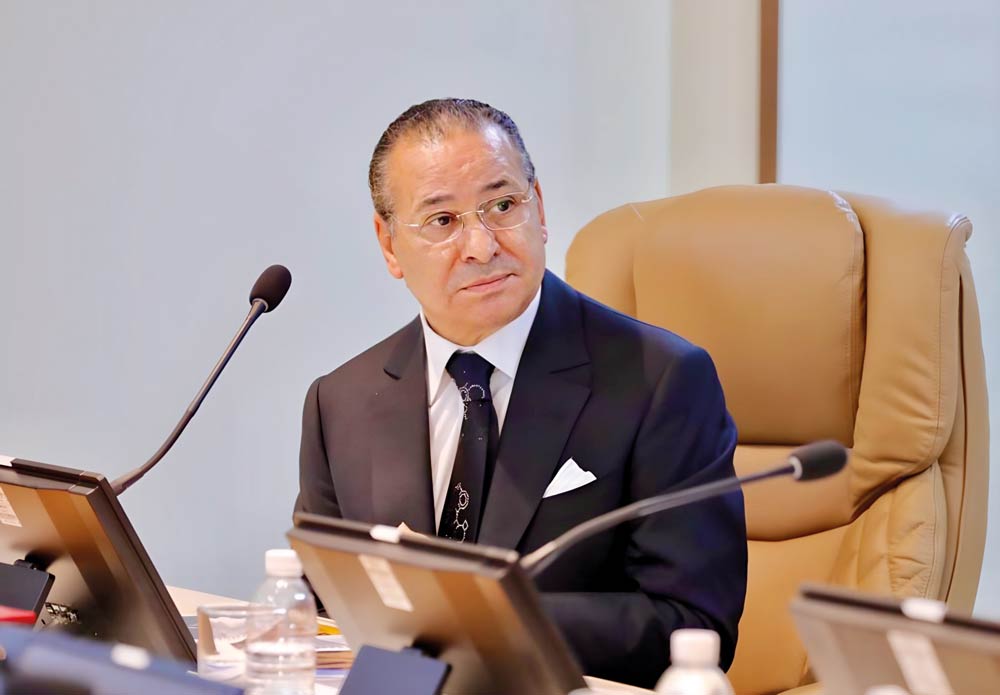
We can make meaningful contributions towards a better world through strategic investments that support and service the general population. This is why the ECAM Council not only seeks to promote greater cooperation and dialogue but also to lay down the real, practical pathways for achieving these investments, thereby building the necessary bridges for a more interconnected and cooperative future.
The ECAM Council has been actively involved in various philanthropic projects across critical sectors like healthcare, education, and training. Could you discuss some of the key projects undertaken by the Council and elaborate on their impacts? How do these projects align with the Council’s goals of fostering development and cooperation within the regions where you operate?
Certainly, the ECAM Council is deeply committed to making tangible impacts in the fields of healthcare, education, and training, as these are pivotal in fostering sustainable development and cooperation across regions. Each project not only addresses immediate needs but also aligns with our broader mission of nurturing long-term partnerships and strengthening community resilience.
One of our notable initiatives was the provision of earthquake aid to Syria, which we launched on February 11, 2023. This project was crucial in delivering immediate relief to affected communities, demonstrating our commitment to rapid response in times of crisis, and emphasizing the importance of solidarity and support among nations in the face of natural disasters.
In the realm of education, we awarded two scholarships in partnership with the Molly Bloom Academy on June 9, 2022. These scholarships are part of our strategy to invest in youth by providing access to quality education, thereby equipping the next generation with the skills and knowledge needed to contribute effectively to their societies.

On August 4, 2021, we made a significant humanitarian donation to Algeria, which was aimed at supporting various community needs. This donation exemplified our commitment to addressing the specific challenges faced by communities, enhancing their well-being, and supporting their developmental aspirations.
Additionally, on July 24, 2021, we initiated a project titled “Oxygen for Tunisian Hospitals.” This was particularly important during the peak of the COVID-19 pandemic, as it directly contributed to the healthcare system’s capacity to save lives and manage the health crisis more effectively.
Another impactful project was the establishment of a Children’s Heart Catheterization Room, launched on June 11, 2021. This specialized medical facility has been instrumental in providing critical healthcare services to children, significantly improving the quality of cardiac care available to young patients.
These projects, each carefully chosen and implemented, reflect the ECAM Council’s commitment to addressing immediate needs while also building the foundation for sustainable development.
By focusing on healthcare and education, we aim to create environments where communities are not only equipped to handle current challenges but are also empowered to forge a brighter future. Each initiative is a step towards realizing our vision of a world where cooperation and development transcend borders, fostering a stronger, more connected global community.
















